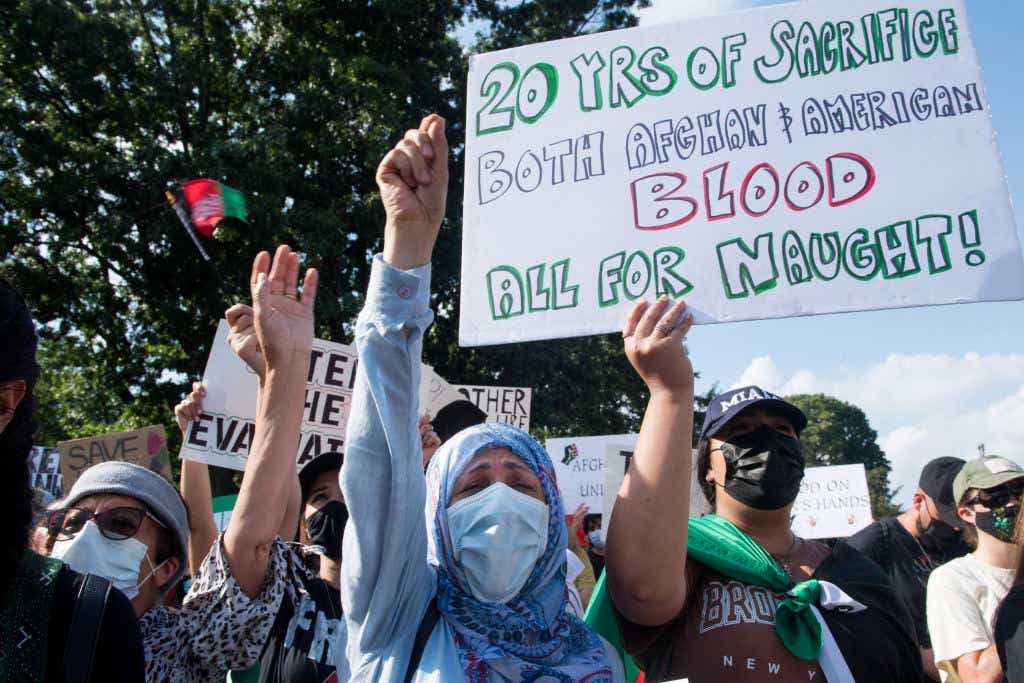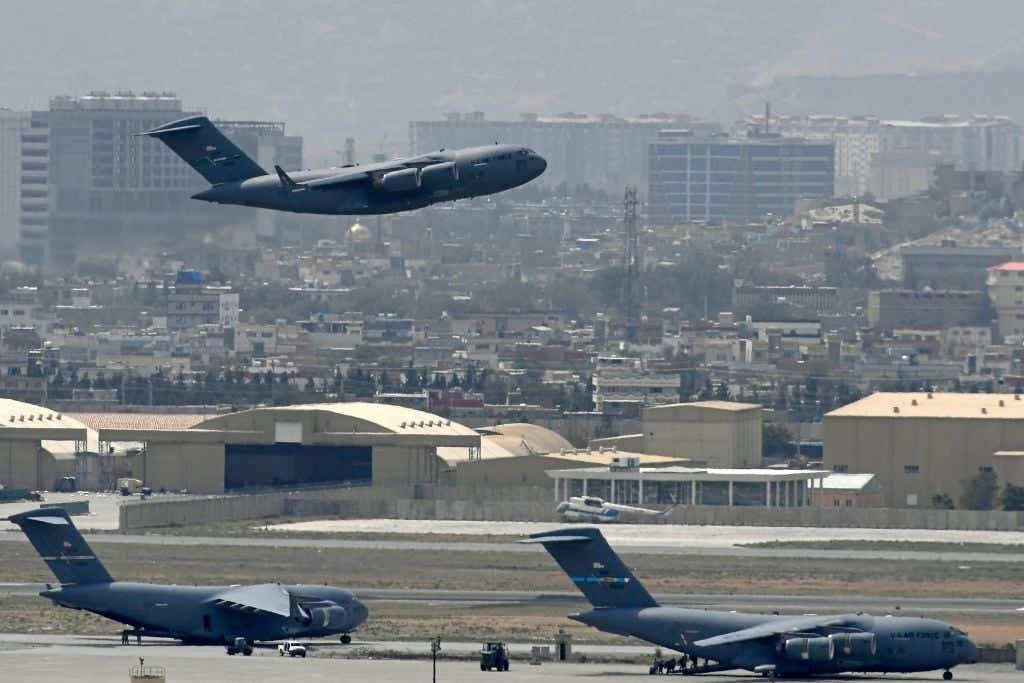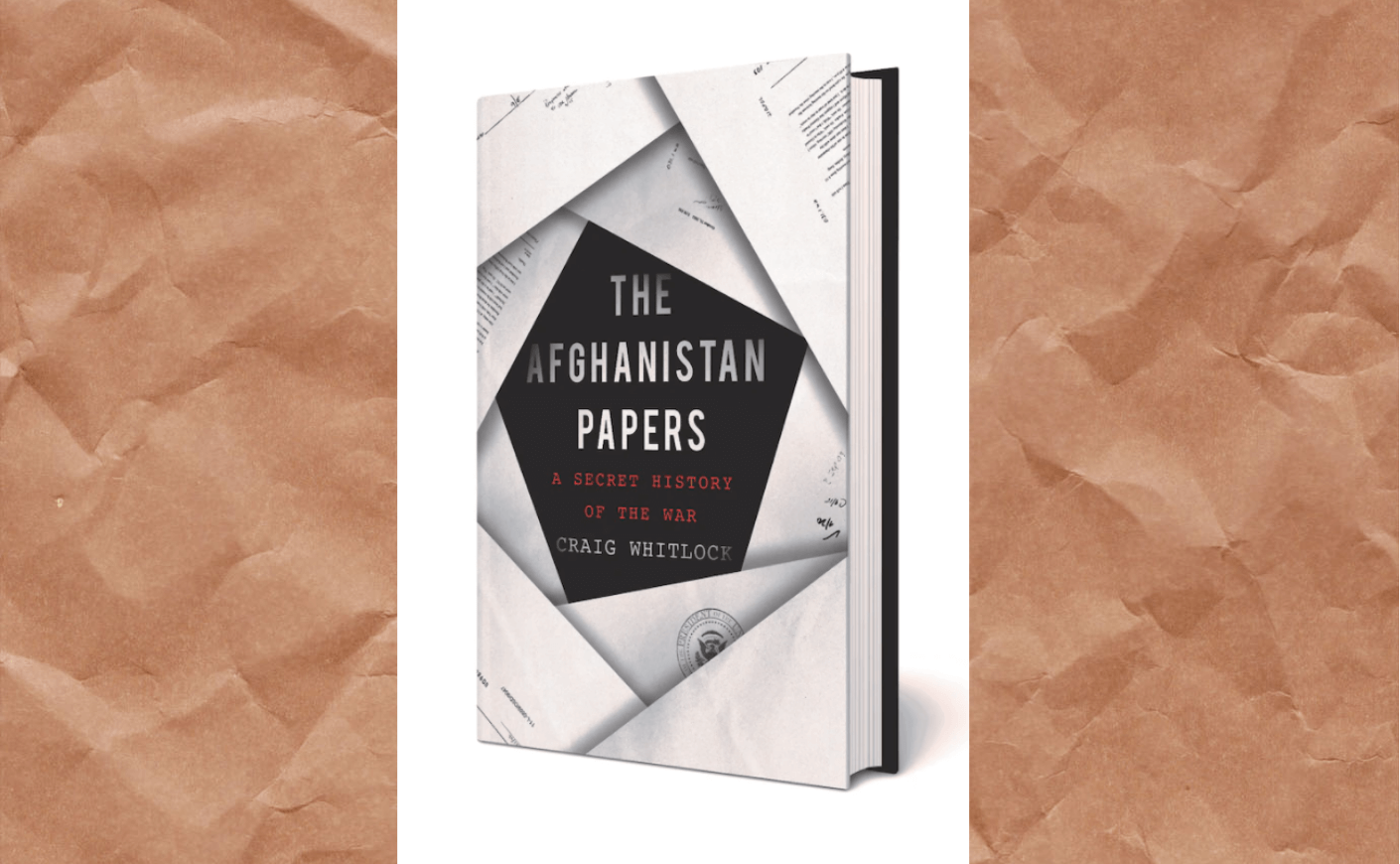By now, Americans are used to waking up each morning to a steady stream of heartbreaking news from Afghanistan: families attempting to flee, the Taliban wreaking violent havoc, American troops killed by an airport bombing. With President Biden having ordered a withdrawal, this two-decade war is on the precipice of ending, and Afghanistan is still far from stable. But according to Washington Post journalist Craig Whitlock, there was little hope of "winning" this war in the first place — and U.S. military officials suspected that all along.
For his latest book, The Afghanistan Papers, Whitlock uncovered countless documents that show how the war in Afghanistan was ill-fated from the start — including interviews with high-ranking U.S. military commanders who admitted to having no viable strategy. The shocking revelations he unearthed are unsettling but must be read, especially for anyone who wants to know what truly went wrong during the 20 years of this grueling, confusing conflict. We talked to Whitlock about the most jaw-dropping moments during his research, and whether he thinks the U.S. is doomed to repeat its mistakes.
KCM: How did this book start?
Craig Whitlock: It was actually five years ago, in the summer of 2016: I'd just gotten a tip that this army general, Michael Flynn — who as you know, became very prominent in Trump's campaign — had given an interview with this obscure government agency called the Special Inspector General for Afghanistan, for some kind of project called Lessons Learned, to figure out mistakes made during the war in Afghanistan.
I was an investigative reporter for the Washington Post, and I'd also covered the Pentagon for many years. And even though Flynn was becoming very controversial politically for supporting Trump, he had served as the director of intelligence for the U.S. and NATO in Afghanistan. So I was really interested to see what he said about the war. I put in a public records request to get a copy of the interview, and at first, the Inspector General said, Sure, we'll give it to you, just give us a few days. But they ended up sitting on it and refusing to share it, which made me only more interested in what Flynn said.
The Post ended up having to sue the Inspector General under the Freedom of Information Act. And while we were doing that, I started wondering who else they interviewed. Then I found out that they’d spoken to hundreds of other people who’d been involved in the war, and thought it’d be interesting to see they said about what went wrong in Afghanistan. At that time, the war wasn't getting much attention, but clearly it hadn't turned out how people thought.
By the time the Post started to get the documents, it became clear that what these former officials were saying was pretty revelatory — about just how screwed up the war had been, and how many mistakes they had made, and how they fundamentally didn't understand Afghanistan. We ended up publishing a series in the Post in December 2019 with the documents we had at that time. And it prompted a pretty strong public response from readers. That’s when we decided this would make for a good book.
KCM: We talk about what went wrong in Afghanistan, but what would success have looked like, according to the U.S. government?
CW: Well, success would have been to have a stable Afghanistan with a government that was friendly to the United States — one that could make sure Al Qaeda or other terrorist groups couldn’t use Afghanistan again as a homebase. That would be success. At the same time, success was never really clearly defined. How do you know when you've reached the stage that an Afghan government would be stable? How do you know when they'd be strong enough to keep groups like Al-Qaeda out? The other problem is that the mission was redefined along the way, and it got much more fuzzy.
Everybody understood why we went to war in Afghanistan in 2001 — it was to go after Al Qaeda and Bin Laden and make sure there wasn't another 9/11. But then Afghanistan was in such terrible shape economically, and from a humanitarian perspective. Then it became a question of, OK, we're responsible for this country because we went to war there, but what are we trying to do? Are we trying to turn it into a democracy? We're trying to help women and girls and children improve their lot in life, but what benchmarks are we trying to reach? That's when you had this mission creep set in, and that's when problems really started to occur. Because again, what would success look like? It was all very vague and there was never really consensus with the American people about what we were trying to do there.
KCM: What were the research challenges in writing this that you hadn’t encountered before?
CW: I've done other investigative projects, but in this case, we ended up obtaining thousands of pages of notes, and most of these interviews weren't structured in any particular way. So how do you sift through all that and make sense of it? I ended up using this software that attorneys use to organize their files for trials to organize all the documents for The Afghanistan Papers. Even today, I can go back in and run reports by theme, by date, by person, by topic. It was a way to organize all the material and be able to recall it so you could tell the story.
KCM: Which pieces of information most surprised you? What were your jaw-dropping moments?
CW: I still remember seeing some documents for the first time — I couldn't believe people said this stuff. One was an interview with Lieutenant General Douglas Lute, an army general who worked in the White House for Bush and Obama and his job there was as the “war czar” — he was overseeing a strategy for the wars in Iraq and Afghanistan under Bush’s second term and Obama's first.
He gave this blistering criticism where he said, “We were devoid of a fundamental understanding of Afghanistan. We did not know what we were doing.” He also said, “2,400 lives lost — who will say that was in vain?” He was referring, of course, to U.S. troops who’d been killed in Afghanistan. For an army general to suggest that the ultimate sacrifice might have been in vain is just unheard of. Because military tradition is that they always venerate the troops who made the ultimate sacrifice — they always say it was for a worthy cause. You want the family members to know that it was worth it. So for a three-star general to suggest that those deaths might have been in vain was just shocking.
An Army general named Dan McNeil, who was the war commander twice during the Bush era, said, “We didn't have a war strategy. We didn't have a campaign plan. I was told to go over and chase terrorists and that's it.” Again, I was stunned: What commanding general in a war says that they don't have a strategy? It's one thing to say you had a bad strategy, or a misguided one, or one that didn't work, but he said we didn't have a strategy at all.

KCM: There's been a pretty stark change in support for the war among Americans over the last 20 years. When do you think that the tide started to turn, and why?
CW: Well, you're right — when the war started in 2001, there was overwhelming support to send troops to Afghanistan, because the country was traumatized over September 11th, and there was real fear that there could be another strike like that. I think it was about a 90% approval rating for Bush when he started the war.
People thought we won the war in the first six months: The Taliban was kicked out of power, and Osama bin Laden wasn't caught yet, but Al Qaeda leaders had all been captured or killed or fled Afghanistan by that point. But as time went on, it became clear that we'd have to keep U.S. troops there, and that the Afghan government wasn't strong enough to stand on its own two feet. American troops kept dying, and the Taliban started to come back. I think the other big shift happened after Obama redoubled his efforts in Afghanistan and sent 100,000 troops there. Obama had promised to end the war before the end of his term in the White House, and when that didn't happen, it became clear that the war was going to drag on even longer. That's what I think public support really started to fade. The public felt like we were promised the war would end, and then it didn’t.
KCM: This war has been compared to the Vietnam War. But what made Afghanistan different?
CW: There’s some real similarities, but the two main differences is that we weren't attacked by Vietnam — we got involved because we were afraid of communism expanding in the region. But the September 11th plot originated in Afghanistan, so it was seen as a war of self-defense. The other big difference was that with Vietnam, we had the draft. Hundreds of thousands of Americans were sent to fight in Vietnam, even though, over time, public support was really waning. A lot of people didn't see it as just, and didn't want to be forced to go. In Afghanistan, we had —and have — an all-volunteer military. So I think in some ways, there's been more of a disconnect. The public didn't feel invested in the same way in Afghanistan.
KCM: What do you think is one of the biggest misperceptions among the American people regarding the war in Afghanistan?
CW: I think the misperception that we were winning — that things were going well. And that's because we were told all along that, even though there were setbacks, everything was headed in the right direction. “We’re making progress” or “We're turning the corner.” And I think as the war dragged on, there was a lot of skepticism about that. Because by definition, if you're at war for 20 years, it's not going very well. Particularly if it's a war you started.
I think Americans, by and large, had faith in the U.S. military, particularly the generals and leaders at the Pentagon. Senior commanders in uniform command a great deal of respect and credibility in the United States. So I think people were wanting to believe them when they said that we were making progress. What's really changed and what people are kind of coming to grips with now, is that senior leaders in uniform weren't telling them the truth.
KCM: Do you feel as if it's possible for the U S to learn from this experience? How optimistic do you feel about the government's ability to use what happened in Afghanistan to avoid future conflicts?
CW: This was the whole irony, right? The interviews we obtained were for an internal government project called Lessons Learned, and the whole point was to talk to people involved in the war to figure out what went wrong, so they wouldn't repeat the mistakes in the future. Then the Washington Post had to file two public records lawsuits to get our hands on this information. Why is that information not shared with the public? To this day, it drives me bananas. There's not a willingness on the part of the government to come clean about what went wrong and learn those lessons. Nobody wants to be assigned blame. Nobody wants to have to deal with accountability. And until that does happen, I don't think we will learn our lesson or learn from our mistakes. Because nobody wants to take responsibility.

KCM: It feels like the exact right time for this book to be released. Does it feel gratifying to be able to release it at this moment?
CW: Yes, in the sense that I think there was a real hunger among people in the United States to hear it straight about what went wrong. Nobody ever really explained to them the gospel truth about what happened. And people forget, because it's been going on for 20 years. They want somebody to draw the big picture and tell them what happened in an impartial but accurate way.
So yeah, it was gratifying to have this come out because I think there's a real demand to know what happened in an unsparing way. That was my goal with the book. People can see these documents in black and white — this isn't people just talking anonymously, trying to make themselves look good. I think that gives this information more credibility, and I think people want that.









